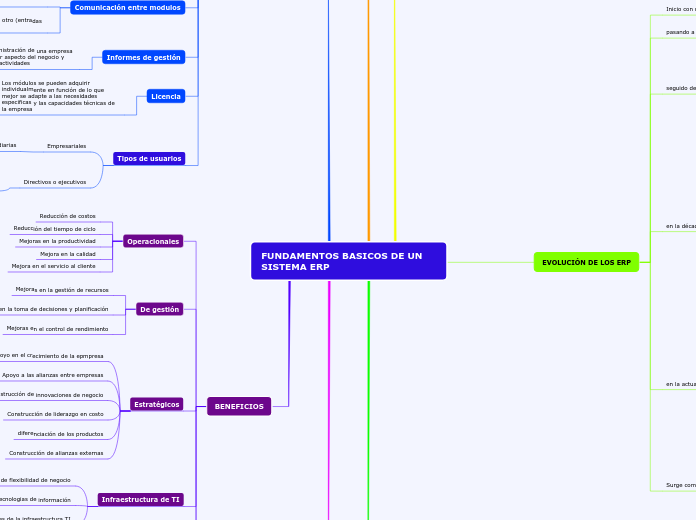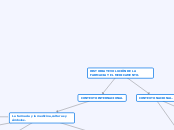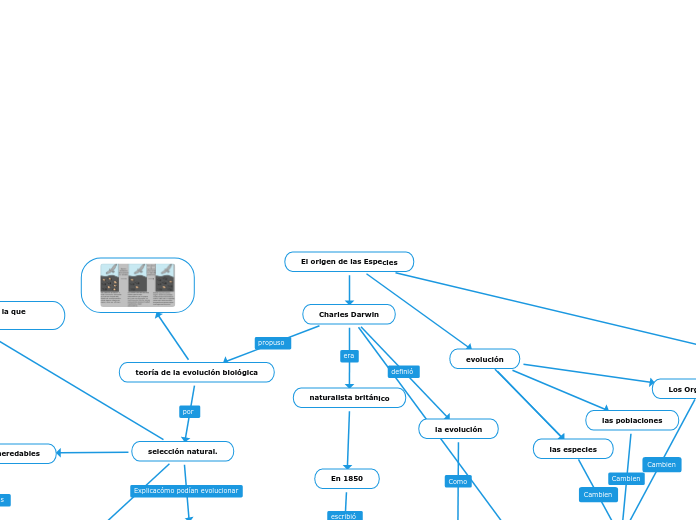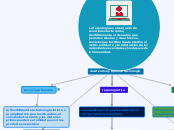LINEA DEL TIEMPO DE LA EVOLUCIÓN DE LOS ERP
FUNDAMENTOS BASICOS DE UN SISTEMA ERP
In linguistics, syntax is the set of rules, principles, and processes that govern the structure of sentences in a given language, usually including word order.
Funcionalidad
E
BENEFICIOS
A compound sentence is a sentence that has at least two independent clauses joined by a comma, semicolon or conjunction. An independent clause is a clause that has a subject and verb and forms a complete thought.
Beneficios tangibles
Es el que afecta directamente el resultado de la operación
Beneficios intangibles
Son los beneficios difíciles de medir
Infraestructura de TI
Incremento e las capacidades de la infraestructura TI
Reducción de costos de tecnologias de información
Con strucción de flexibilidad de negocio
Estratégicos
Construcción de alianzas externas
diferenciación de los productos
Construcción de liderazgo en costo
Construcción de innovaciones de negocio
Apoyo a las alianzas entre empresas
Apoyo en el crecimiento de la epmpresa
De gestión
Create your own compound sentences, using the coordinators above.
Mejoras en el control de rendimiento
Mejorasen la toma de decisiones y planificación
Mejoras en la gestión de recursos
Operacionales
When independent clauses are joined with coordinators (also called coordinating conjunctions), commas and semicolons, they do more than just join the clauses. They add meaning and flow to your writing.
Mejora en el servicio al cliente
Mejora en la calidad
Mejoras en la productividad
Reducción del tiempo de ciclo
Reducción de costos
ARQUITECTURA
A complex sentence is a sentence that contains an independent clause and one or more dependent clauses.
An independent clause can stand alone as a sentence, but a dependent clause even though it has a subject and a verb cannot stand alone.
Tipos de usuarios
Directivos o ejecutivos
Ejecuta informes y realiza investigaciones que permiten la toma de decisiones
Empresariales
Realiza operaciones diarias
Informes operativos
Entradas de datos
Licencia
Attributive clauses serve as an attribute to a noun (pronoun) in the main clause. This noun or pronoun is called the antecedent of the clause.
Los módulos se pueden adquirir individualmente en función de lo que mejor se adapte a las necesidades especificas y las capacidades técnicas de la empresa
Informes de gestión
An adverbial clause is a group of two or more words that function as an adverb in a sentence.
Con los módulos integrados la administración de una empresa puede ejecutar reportes de cualquier aspecto del negocio y obtener una completa visión de las actividades
Comunicación entre modulos
An appositive clause follows another noun or noun phrase in apposition to it; that is, it provides information that further identifies or defines it.
El flujo de información puede ir de un modulo a otro (entradas contables)
esto quiere decir que un modulo puede compartir información almacenada con otros módulos (listado de proveedores)
Modular e integral
The subject clause is a dependent clause that acts as a subject.
Esta forado por múltiples módulos conectados entre si
Áreas de negocio
A predicative clause may be introduced by conjunctions - that, whether, whether... or, as, as if, as though, because, lest, the way - or connectives.
The latter may be conjunctive pronouns - who, whoever, what, whatever, which - or conjunctive adverbs - where, wherever, when, whenever, how, why.
Un ERP integra todas las áreas de operación de una empresa incluyendo:
marketing
Gestión de materiales
Distribución
Ventas
Recursos humanos
Compras
Producción
Objetivo
The object clause is a phrase on which a verb performs an action. It falls at the end of a sentence, and is governed by a verb or a preposition.
Es necesario que la información sea correcta para la persona correcta en el momento correcto
CARACTERISTICAS
Procedimiento de ajuste
Actualización
Localización
Costos de mantenimiento
Grado de abstracción
Parametrización
adaptabilidad
Modular
los ERP tienen un largo alcance funcional y están formados por módulos.
Bases de datos
See the example below and try to create your own simple sentences.
Tim is driving the red car.
utilizan una base de datos corporativa en una arquitectura cliente- servidor.
Integración
See the example below and try to create your own simple sentences.
Tim is driving the car with his mother.
integran diferentes áreas de la empresa aunque existe confusión en dos términos.
sistemas integrados
es el medio para lograr el objetivo
empresa integrada
es el objetivo
Estándares
See the example below and try to create your own simple sentences.
Tim is the driver.
los sistemas ERP incorporan estándares en los procesos de la empresa definidos como un conjunto de tareas y procedimientos.
Paquetes de Software
See the example below and try to create your own simple sentences.
Tim drives the car.
los ERP son paquetes de software comercial con la idea de resolver dos principales problemas
presupuestos
Incumplimientos de plazos
EVOLUCIÓN DE LOS ERP
See the example below and try to create your own simple sentences.
Tim drives.
Surge como resultado de tres aspectos
la reingeniería de las empresas para cambiar el enfoque funcional en una visión de procesos de negocio
el desarrollo de una visión integrada de los SI
avances tecnológicos de hardware y software necesarias para soportar el sistema
en la actualidad
ayudan a gestionar
Business Intelligence (BI)
ciclo del producto (PLM)
Con el distribuidor (PRM)
con el proveedor (SRM)
Relación con los clientes (CRM)
cadena de suministro (SCM)
en la década de los 90 las areas de:
interacción con stock, compras y vetas
capacidad contable y financiera
eficacia administrativa
Organizacional
Construcción de una visión compartida
Enriquecimiento del puesto de trabajo
Facilitar el aprendizaje organizacional
Cambios en los patrones de trabajo
visibilidad
negocio
seguido de
la gestión de proyectos como:
producción
gestión de la demanda
recursos humanos
finanzas
pasando a
el área de producción para el control de abastecimiento y planes de producción
Inicio con un simple control de inventario
CONCEPTO
OBJETIVO
reducción de tiempo y de los costos del proceso
eliminación de datos y operaciones innecesarias
compartir información entre todas los componentes de la empresa
acceso a toda la información de manera confiable, precisa y oportuna
Optimización de procesos empresariales
Son herramientas de integración de procesos en una empresa, promoviendo el pensamiento sobre objetivos corporativos, permite tener toda la información de la empresa en todo momento permitiendo la toma de decisiones de forma asertiva
Subtopic
IMPLEMENTACIÓN
Instalar el sistema
The predicative is defined as an adjective or noun forming or contained in the predicate.
Its main trait is that it serves to express a property that is assigned to a 'subject'.
For e.g.: The dog is old.
llenar los vacíos entre los requerimientos del negocio y funcionalidad ofrecida por el sistema ERP
Personalizar el sistema
Traditional grammar defines the object in a sentence as the entity that is acted upon by the subject.
Adecuar bajo los propios requerimientos
The direct object is the receiver of the action mentioned in the sentence.
Realizar configuración
The predicate of a sentence is the part that modifies the subject in some way. Because the subject is the person, place, or thing that a sentence is about, the predicate must contain a verb explaining what the subject does and can also include a modifier.
Configurar el sistema de tal forma que comience a funcionar según los requisitos del ngocio
Estudio de requerimientos
The subject of a sentence is the person, place, thing, or idea that is doing or being something. You can find the subject of a sentence if you can find the verb.
Ask the question, 'Who or what 'verbs' or 'verbed'?' and the answer to that question is the subject.
Averiguar como se debe comportar el sistema ERP









